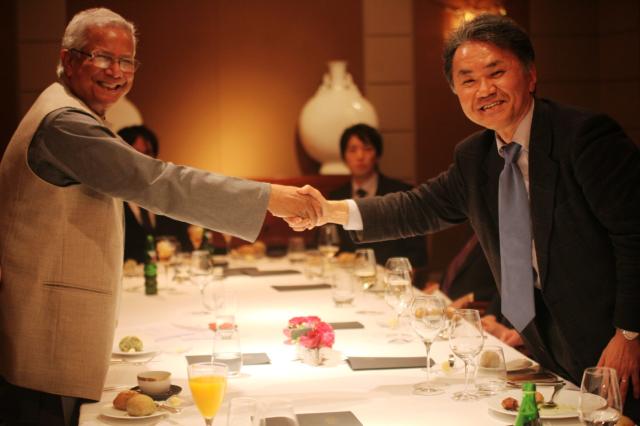Who I Was Then - A Life-Changing Encounter
A certain encounter changed my life. It was when I met Dr. Muhammad Yunus. On March 18, 2008, I visited him for the first time at the Grameen Bank headquarters in Bangladesh. The founder of Grameen Bank, Dr. Yunus won the Nobel Peace Prize in 2006. I found him to be a person of warmth, charisma andvirtue. Although we were meeting for the first time, I asked him candidly, “Do you think microfinance can be done in Japan?” (As a type of financing intended for impoverished people, microfinance includes small, unsecured loans.) His unequivocal answer was “It can definitely be done in Japan, too.”
At the time, the conventional wisdom in academia and business was that microfinance could only work in developing countries—and only in agricultural communities; something like “group lending” for a five-person group in a big city in an economically advanced country was considered unfeasible. I carried out field research and studies with the aim of bridging the theory and practice of microfinance and social business. Later, I was away from Japan for a time on overseas assignments. Japan is an advanced nation with the world’s third-highest GNP, and in the past people used to say that almost all Japanese were middle-class. But with increased poverty and a widening economic gap, today one in six people is forced to live below the poverty line. When I returned to Japan in August 2016 I decided that, if no one else was going to do it, I would be the one to start up “Grameen Nippon” (the Japanese version of Grameen Bank).
It’s been about ten years since Dr. Yunus encouraged me by saying it could definitely be done in Japan. The anxieties and worries were endless—“Are things like microfinance really possible in Japan? Can financing for a group of five people really be done in Japan? How exactly should I go about it?” Struggling to reach a final resolution, I had many sleepless nights.
The turning point for me was the situation in the photo below. On February 21, 2017, Dr. Yunus gave me a push once again. “You’re the only one who can do this,” he said. He and I agreed on the establishment of Grameen Nippon, and shook hands. With that handshake, the nature of my sleepless nights was transformed: sleeplessness due to anxiety turned into sleeplessness from the excitement of thinking about what I was going to do the next day. I even came to think that the reason I’d done administrative work in the Ministry of Finance for over 30 years was to eventually do microfinance. Every time I meet Dr. Yunus, he gives me courage and hope. He’s the person in my life who I respect the most.
About six months after that handshake, the Grameen Nippon Preparatory Organization was launched in order to establish Grameen Nippon, and a number of people joined on. Lawyers, accountants, strategy consultants, people working for corporations, financial institutions and NPOs, students and others came to work pro bono.
The top priority of Grameen Nippon is to create “a poverty-free society in which everyone can live vibrant, fulfilling lives.” We don’t expect it to be smooth sailing; there are sure to be many ups and downs. But we’re committed to the unwavering objective of helping the poor, and we’re resolved to stay the course no matter what. “The more difficult the goal appears, the more exciting the work is.” Those are the words of Dr. Yunus. We are carrying out Grameen Nippon with exactly that feeling.
Grameen Nippon is currently in its beginning stage. We need the help of many people—financial assistance, personnel support, business assistance and more. As expressed in its motto “Far together!”, Grameen Nippon aims to move ahead in cooperation with colleagues and many others. Microfinance and social business are rooted in altruism; thus, they resonate with Meiji Gakuin University’s foundational principle, “Do for Others.” We will be sincerely grateful for your support.
Masahiro Kan
Professor, Faculty of Law

